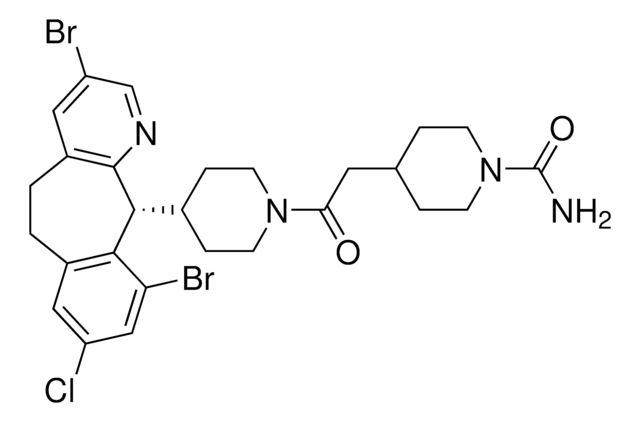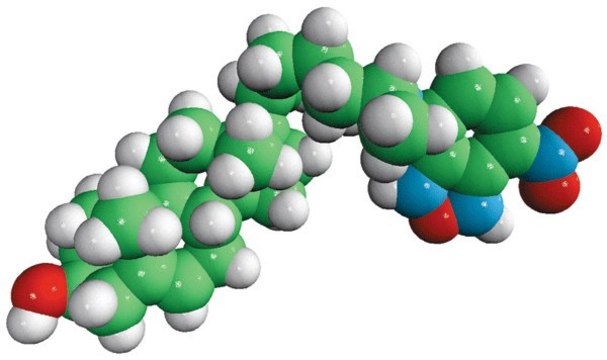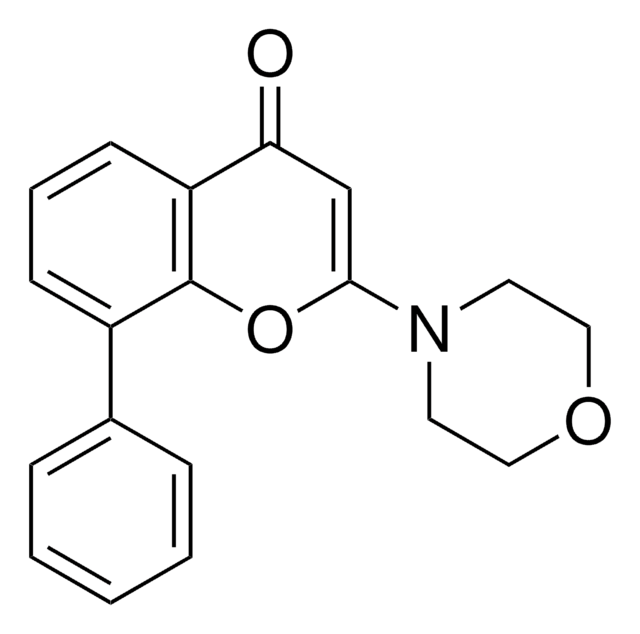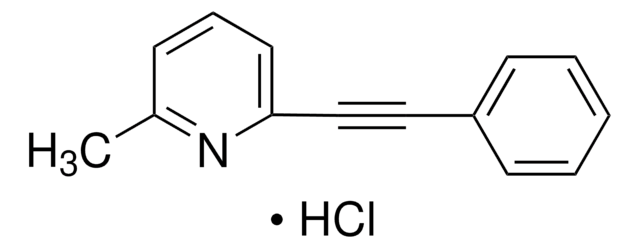SML2862
MC1742
≥98% (HPLC)
동의어(들):
5-(4-(Biphenyl-4-yl)-6-oxo-1,6-dihydropyrimidin-2-ylthio)-N-hydroxypentanamide, 5-[(4-[1,1′-Biphenyl]-4-yl-1,6-dihydro-6-oxo-2-pyrimidinyl)thio]-N-hydroxypentanamide, MC 1742, MC-1742
로그인조직 및 계약 가격 보기
모든 사진(1)
About This Item
실험식(Hill 표기법):
C21H21N3O3S
CAS Number:
Molecular Weight:
395.47
MDL number:
UNSPSC 코드:
12352200
NACRES:
NA.77
추천 제품
Quality Level
분석
≥98% (HPLC)
양식
powder
색상
white to beige
solubility
DMSO: 2 mg/mL, clear
저장 온도
2-8°C
SMILES string
S(CCCCC(=O)NO)c1[nH][c](cc(n1)c2ccc(cc2)c3ccccc3)=O
InChI
1S/C21H21N3O3S/c25-19(24-27)8-4-5-13-28-21-22-18(14-20(26)23-21)17-11-9-16(10-12-17)15-6-2-1-3-7-15/h1-3,6-7,9-12,14,27H,4-5,8,13H2,(H,24,25)(H,22,23,26)
InChI key
AOFVDNFTELWRHV-UHFFFAOYSA-N
생화학적/생리학적 작용
Histone deacetylases inhibitor against class I (HDAC1/2/3/8), IIB (HDAC6/10), IV (HDAC11) HDACs with anti-cancer and HIV latency reativation potency.
MC1742 is a uracil-based hydroxyamide (UBHA) that acts as a subtype-selective histone deacetylases (HDACs) inhibitor (IC50: class I HDAC1/2/3/8 = 100/110/20/610 nM, class IIB HDAC6/10 = 7/40 nM, class IV HDAC11 = 100 nM, class IIA HDAC4/5/7/9 >50 μM). MC1742 exerts greater antiproliferation potency than SAHA in sarcoma cancer stem cell (CSC) cultures (MC1742/SAHA IC50 in μM = 0.25/1/RD, 1.12/1.13//MG-63, 1.4/3.92/SK-ES-1 post 72-hr treatment) and effectively reactivates HIV from latency (EC50 = 350 nM; JLAT 10.6 cells) by upregulating histone acetylation at the HIV promoter without activating T cells.
Storage Class Code
11 - Combustible Solids
WGK
WGK 3
Flash Point (°F)
Not applicable
Flash Point (°C)
Not applicable
가장 최신 버전 중 하나를 선택하세요:
Elleard Fw Heffern et al.
Journal of virus eradication, 5(2), 84-91 (2019-06-14)
Current antiretroviral therapy can suppress HIV replication, increase CD4 count and result in increased lifespan. However, it cannot eradicate the virus due to the presence of latent provirus in cellular reservoirs, such as resting CD4+ T cells. Using combination latency-reversing
Tokuhiro Chano et al.
American journal of cancer research, 6(4), 859-875 (2016-05-18)
The glycolytic-based metabolism of cancers promotes an acidic microenvironment that is responsible for increased aggressiveness. However, the effects of acidosis on tumour metabolism have been almost unexplored. By using capillary electrophoresis with time-of-flight mass spectrometry, we observed a significant metabolic
자사의 과학자팀은 생명 과학, 재료 과학, 화학 합성, 크로마토그래피, 분석 및 기타 많은 영역을 포함한 모든 과학 분야에 경험이 있습니다..
고객지원팀으로 연락바랍니다.








